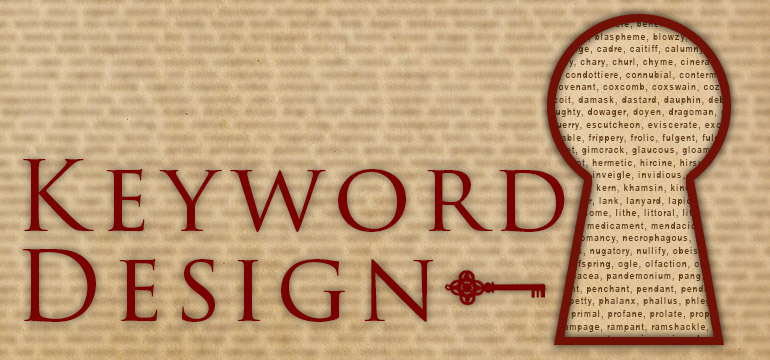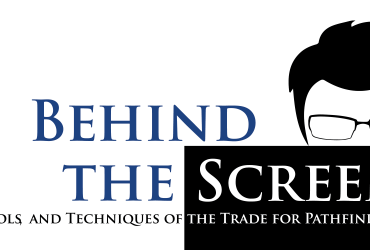In Keyword Design, I use a single word as inspiration for a mundane item, a magic item, a feat, a spell, and a class option. Today’s word is “prediction” as suggested by Aaron.
You might expect a lot of divination options for this week’s keyword, so let’s see if your prediction comes true.
| Prediction | ||
| TYPE | NAME | DESCRIPTION |
| Mundane Item | Dream Journal | An easy-to-access book to write down and reference deep thoughts |
| Magic Item | Future Almanac | A history book from the future to guide readers through the present |
| Feat | Precognition | Use abilities that allow a reroll after nthe results are determined |
| Spell | Predict action | Prevent targets from performing the actions you predict they will attempt |
| Class Option | Precog | An inquisitor archetype that passes judgement based on psychic instinct |
New Mundane Items
DREAM JOURNAL
Cost: 65 gp Weight:1 lb
Description
Great minds never rest, and many come up with their best ideas in their sleep. Who knows how many ideas have been lost for want of a quill or inkpot, or found ilegible in the morning after a closed cover smeared the ink. A dream journal is a book of blank pages with an inkpen affixed to the cover. The ink in the inkpen is alchemically designed to dry quickly. Once per day, a dream journal allows the owner to reroll a Knowledge skill they failed the day before, as long as the dream journal was within the owner’s reach when they went to sleep.
Some keywords don’t lend themselves to mundane items and I get to have fun stretching the meaning of the word to find a nonmagical application. Rerolls are not usually mundane item territory, but this one nonmagically taps into the unconscious mind. I think it’s warranted. Sadly, the trip from concept to design that this option took had it drift away from the keyword more than I’d have liked.
New Magic Item
FUTURE ALMANAC
Aura faint divination; CL 5th; Slot -; Price 900 gp; Weight 1 lb
DESCRIPTION
These history books are written in the future and dropped through time or written in the present about the future based on premonitions. In either case, the language can be mystifying. If decrypted, however, the writing provides valuable insight into the near future. Although a future almanac is too broad to specifically foretell a day’s events, it provides enough hints about major events, weather, and other small influences that can combine for a large impact.
Gleaming enough value from the current day’s entry requires a DC 15 a Knowledge (History) or Linguistics skill check and 4 hours of dedicated reading. For every 5 by which the check exceeds the DC, the reading time required is reduced by 1 hour (minimum 1). A successful check allows the user to choose either to act normally in a surprise round in the next 24 hours or gain a +5 insight bonus to an Initiative check in the next 24 hours. A future almanac can be used 1/day.
CONSTRUCTION REQUIREMENTS
Craft Wondrous Item, anticipate peril; Cost 450 gp
This started as a mundane item that traveled back in time, but I thought it made a more interesting magic item. The inspiration is probably obvious.
Anticipate peril is not a spell I was aware of. It’s too bad the duration is so short, but it’s a spell I’ll keep in mind if I ever play a bard.
New Feat
PRECOGNITION
You can predict impending failure at the exact point of of no return.
Prerequisite: Ability that allows a reroll before the results of the roll are revealed
Benefit: Whenever you use an ability that allows a reroll, you can wait until after the results of a roll are revealed before deciding whether to use your reroll ability.
Honestly, I think all reroll abilities should be used immediately after the results are determined, for various reasons:
Some DCs, like skill checks, are set in the CRB, so you know whether a roll succeeded or failed before the results are revealed;
- Some DCs, like AC, are easy enough to figure out after a few round, so eventually you know whether a roll succeeded or failed before the results are revealed;
- It is frustrating to GM a character with an open-ended reroll ability because you either:
- Have to wait for them to weigh in on whether they’re going to use their reroll ability after every roll but before any result;
- Ask them if they’re going to use the ability only when the roll is close, heavily hinting what the DC is;
- Allow them to say “I would have rerolled that,” possibly with time for debate about whether they really would have rerolled that before the results.
If anyone can tell me the advantage to waiting until after the results are determined, let me know because I really can see even one.
New Spell
PREDICT ACTION
School enchantment (compulsion) [language-dependent, mind-affecting]; Level alchemist 2, bard 2, cleric 2, inquisitor 1, magus 2, psychic 2, sorcerer/wizard 2, witch 2
CASTING
Casting Time 1 standard action
Components S, M (an envelop and small piece of parchment)
EFFECT
Range close (25 ft. +5 ft./2 levels)
Target one creature/round, up to one creature/level
Duration 1 round/level
Saving Throw: Will negates; Spell Resistance: yes
DESCRIPTION
If the caster correctly predicts the action the target attempts this round, they are unable to perform that action this round, as the spell forbid action.
To predict an action, designate a target within range and write one of the following actions on a piece of paper as a free action, but do not show it to anyone: attack, cast, communicate, draw, or move. If the target attempts the action, reveal the card. That character is unable to perform that action this turn. They may perform other actions instead, but any action already performed this round (such as moving into melee to attack then being forbidden from attacking) still happened.
I admit that a lot of my spells are “like X existing spell, but…” I just think that a particularly good “but” (heh) justifies derivative design.
New Class Option
PRECOG (Inquisitor archetype)
 Resolute despite having only their own premonitions judging the guilty, precogs are seen as dangerously fanatical even by other inquisitors.
Resolute despite having only their own premonitions judging the guilty, precogs are seen as dangerously fanatical even by other inquisitors.
Psychic Scholar (Ex): Precogs must spend 4 skill ranks each level on Intelligence-based skills. All Knowledge skills are class skills for precogs, as is Linguistics.
This ability alters an inquisitor’s class skills and skill ranks per level.
Spells: A precog casts psychic spells drawn from the psychic class spell list. Only spells from the psychic class spell list of 6th level or lower are considered to be part of the precog spell list. To learn or cast a spell, a precog must have an Intelligence score equal to at least 10 + the spell’s level. The saving throw DC against a precog’s spell is 10 + the spell’s level + the precog’s Intelligence modifier.
This ability alters an inquisitor’s spellcasting and orisons ability.
Discipline: Like a psychic, a precog accesses and improves her mental powers through a particular method, such as rigorous study or attaining a particular mental state. Each discipline grants a number of powers, depending on the level of the precog. A precog does not gain the bonus spells listed for each discipline. She gains the first power at 1st level and the second power at 6th level. She does not gain the third discipline power automatically but can choose to gain it in place of a judgment staring at 13th level.
A precog uses her inquisitor level as her effective psychic level when determining the power and effect of her domain powers. If the inquisitor has psychic levels, she must select the same discipline. Levels of psychic and inquisitor stack for the purpose of determining discipline powers and abilities, but not for bonus spells.
This ability replaces the domain ability.
Precognition (SL): You can cast precognition, as the spell, a number of times per day equal to her Intelligence modifier.
This ability replaces the monster lore ability.
Brilliant Initiative (Ex): At 2nd level, a precog adds her Intelligence modifier on initiative checks, in addition to her Dexterity modifier.
This ability replaces cunning initiative.
Detect Thoughts (Sp): At 2nd level, a precog can detect thoughts, as per the spell, for a number of rounds per day equal to her inquisitor level. These rounds do not need to be consecutive.
This ability replaces the detect alignment ability.
Teamwork Feat: This ability functions exactly like the inquisitor ability of the same name, except a precog can change her most recent teamwork feat a number of times per day equal to her Intelligence modifier instead of her Wisdom modifier. This does not count as modifying the Teamwork Feat ability for the purposes of taking more than one inquisitor archetype.
My expectations changed for this archetype several steps along the way. It was originally going to be an investigator archetype called Esper, and functionally put the cart before the horse for investigations (solving them psychically then finding the evidence to prove it), but the psychic detective already fills that niche. Surprisingly, the inquisitor did not have a psychic archetype, so my concept changed to solving crimes psychically then passing judgment, skipping over the whole “proving it” step. However, after rereading the vanilla inquisitor I realized that there isn’t a huge difference thematically between passing judgment “because my god said so” and passing judgment “because my brain said so”. On the other hand, there is a huge mechanical difference between a Wisdom-based inquisitor and an Intelligence-based inquisitor. Ultimately there wasn’t a lot of creative writing in creating this class as much as there was finding and replacing everything Wisdom-based.
At the last minute I realized that an Intelligence-based caster with 6+Int skill ranks per level made it dangerously skillful. Instead of just lowering the number of skill ranks per level, I made a new ability that limited the flexibility of how you can spend them. To gain access to 6th level spells, a precog will need Int 16, which means 9 skill ranks per level. Almost half of them are dedicated to Int-based skills, which makes sense for a psychic, learning tomorrow’s lesson today.
I’m also going to bring attention to how I wrote the Teamwork Feat ability. There are archetypes (and base classes, namely the oracle) that modify the base class’ key ability score without changing all the ways the class uses the key ability (ie the oracle, a Charisma-based class, adds her Wisdom modifier to its spiritual weapon’s attacks because the spell was written for clerics, not because using the oracle’s Charisma modifier would throw off the balance of the spell). So changing the number of times per day a precog can change her most recent teamwork feat from Wisdom to Intelligence removes a potentially key ability score oddity without significantly changing the class feature. However, it’s such a minor change and not one related to theme, so I don’t think it should disqualify the precog from stacking with archetypes that completely remove that ability.
Thanks again to Aaron for the keyword suggestion. If you have thoughts on the balance and use of these abilities, or you would like to offer a single word that you think can inspire a mundane item, a magic item, a feat, a spell, and a class option, let me know in the comments below.





